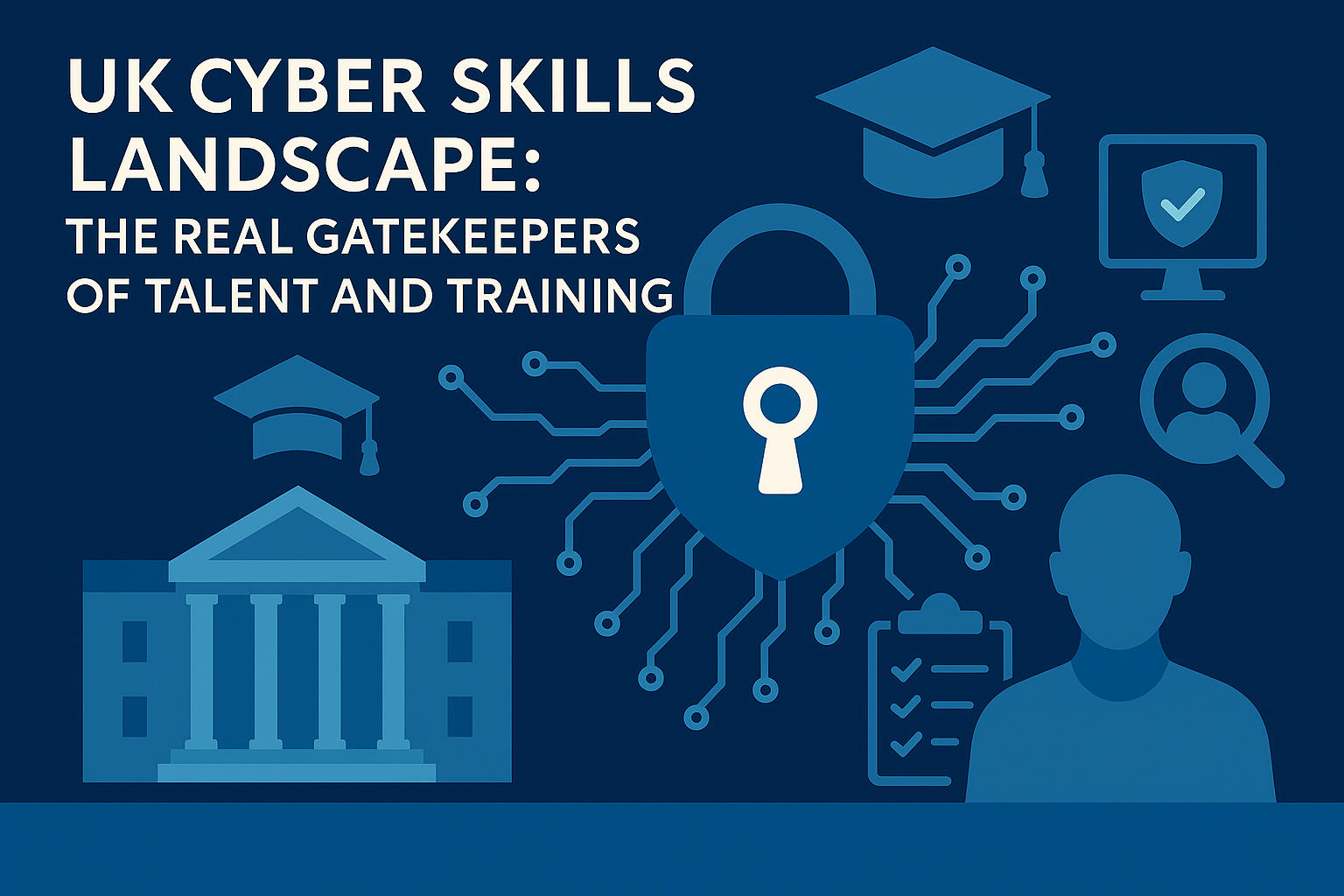Beyond bootcamps and degrees, who actually shapes how the UK finds, trains, and qualifies its cyber workforce? The UK cyber skills gap is well known, but less discussed is who actually defines what “skilled” means, who sets the standards, and who controls the flow of talent into real jobs. From formal certifying bodies to regional academies, neurodivergent networks to employer-led bootcamps, this article maps out the real gatekeepers of UK cyber skills and training, the organisations, programmes, and influencers that determine who gets hired, funded, or fast-tracked.
Contents
- Contents
- 1. The Core National Gatekeepers
- 2. Employer-Led Bootcamps and Conversion Routes
- 3. Regional Skills Powerhouses
- 4. Certification Bodies and Influencer Orgs
- 5. Inclusive and Non-Traditional Routes
- 6. University Programmes with Real Employer Pull
- 7. What’s Changing in 2025 and Beyond
- Final Thoughts
- References
1. The Core National Gatekeepers
UK Cyber Security Council (UKCSC)
- Chartered by government to define the UK’s cyber profession
- Responsible for creating chartered pathways, professional titles, and sector-wide standards
- Works with CIISec, BCS, IET, and others to map career progression frameworks
Why it matters: If you’re defining a job role, assessing qualifications, or creating a new cyber training programme, you’re likely using their frameworks, whether directly or via partners.
CIISec (Chartered Institute of Information Security)
- Leads on mapping real job roles and certifications to the Skills Framework for the Information Age (SFIA+)
- Offers personal certifications from Entry Level through to Fellow
- Works closely with DSIT, MOD, and public sector employers
Why it matters: CIISec-approved job specs often determine who qualifies for a role, especially in government, consultancy, and defence.
NCSC-Assured Training & CyberFirst
- CyberFirst sets the tone for early-career talent: schools outreach, bursaries, competitions, and apprenticeships
- NCSC also runs assured training schemes for experienced practitioners, including Pen Testing, Incident Response, and Security Architecture
Why it matters: It’s the gold standard for both grassroots and professional credibility, especially for those working in, or selling into, the public sector.
2. Employer-Led Bootcamps and Conversion Routes
SANS UK Cyber Academy
Industry-recognised, high-intensity courses in incident response, detection engineering, and cloud security. Often employer-funded and aimed at career-switchers.
QA, Capslock, and Immersive Labs
Offer GCHQ/NCSC-aligned bootcamps and simulations. Widely respected by employers looking for practical skillsets over theory.
TechUK’s Cyber Skills Working Group
Convenes employers to shape funding models and curriculum. Members include big consultancies, vendors, and regional talent programmes.
Why it matters: Many hiring managers trust these routes more than academic degrees for technical roles, especially where rapid upskilling is required.
3. Regional Skills Powerhouses
West Midlands Cyber Resilience Centre (WM CRC)
Offers student placements, police-led training, and access to real-world cyber cases. Strong focus on SMEs, practical assurance, and diversity.
Cyber College Cymru / Cyber Wales Academy
Home-grown talent pipelines linked to the Welsh cyber ecosystem. Routes into NCSC, Dstl, and commercial employers.
Scotland’s Cyber Quarter (Abertay University, Napier, etc.)
Blending academic rigour with startup accelerators and industry-led cyber labs.
Cheltenham and CyNam
Proximity to NCSC and GCHQ drives a strong local ecosystem of apprenticeships, contractor roles, and innovation pipelines.
Why it matters: Regional players often act as gateways into both cyber jobs and public funding, especially for underrepresented groups.
4. Certification Bodies and Influencer Orgs
| Organisation | Influence Type |
|---|---|
| BCS | Core in skills policy, digital apprenticeships |
| ISACA & (ISC)² | Employers rely on CISM, CISSP, and other certs for assurance |
| IASME | Runs assessor training and Cyber Essentials certifications |
| IET | Engaged in engineering + cyber crossover roles (OT/ICS, SCADA) |
| CompTIA | Still dominates entry-level certs for SMEs and helpdesk roles |
5. Inclusive and Non-Traditional Routes
Neurodivergent in Cyber, CyberWomen@Birmingham, WiCyS UK
- These groups don’t just advocate, they place
- Actively refer candidates, feed into policy reviews, and shape new training pilots
- Increasingly recognised by DSIT and UKCSC as trusted voices on future skills
CyberFirst Bursary Alumni & Mentorship Circles
- Informal networks that carry significant hiring influence
- Trusted by both NCSC and wider industry to vouch for early-career talent
Psyber, Cyber Tzar, and Cyber Runway Alumni
- Offer research-to-product pathways for academic or neurodivergent talent
- Shape new cyber startup job roles and training expectations outside the formal pipeline
6. University Programmes with Real Employer Pull
While not exhaustive, these universities are well-respected for practical, employment-aligned training:
- University of Warwick – Cyber strategy, SOC capability, and placements
- Royal Holloway (RHUL) – Cryptography, cyber law, and policy
- University of South Wales – Forensics, OT, and cyber crime
- Abertay University – Ethical hacking and games security
- UCL / Oxford – For academic-to-industry research crossover
Why it matters: Degrees here tend to be backed by NCSC or DSIT programmes, and are trusted by hiring managers who value employability over theory.
7. What’s Changing in 2025 and Beyond
- Apprenticeships are rising, especially Level 4 and 6 Digital & Cyber options
- Chartership is becoming standard, UKCSC + CIISec pushing for title protection and industry regulation
- AI skills are being blended into cyber, detection, auditability, assurance
- Regional academies are being funded, e.g. through Cyber Local, LSIPs, and Mayor-led initiatives
Final Thoughts
The UK cyber skills landscape is more than a pipeline, it’s a multi-layered ecosystem. What matters most isn’t which course you take, but who vouches for you, who trains you, and who connects you to real-world work.
In cybersecurity, credibility is earned, and gatekeepers matter.
References
- Inside the UK Cyber Ecosystem: A Strategic Guide in 26 Parts
- The Insider’s Guide to Influencing Senior Tech and Cybersecurity Leaders in the UK
- UK Cyber Skills Landscape: The Real Gatekeepers of Talent and Training
- Cyber and Academia in the UK: Research Centres, Spinouts, and Influence
- Cyber Clusters and Regional Powerbases: Influence Beyond London
